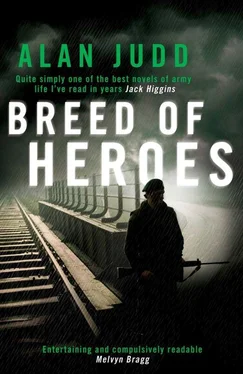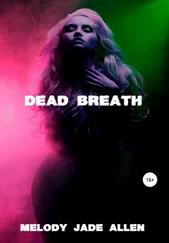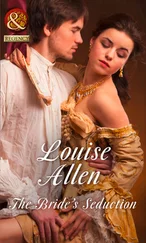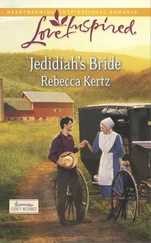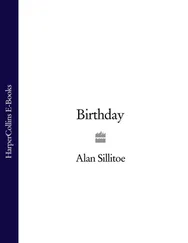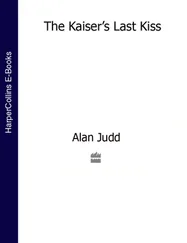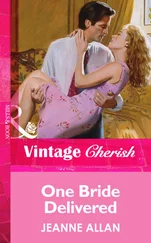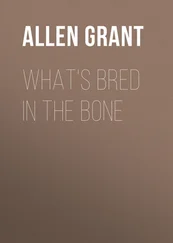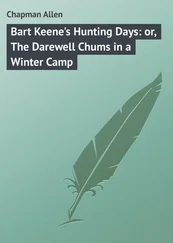Beazely was aghast. ‘What about me?’
‘You can come if you like.’
Beazely’s face was screwed up in anguish. ‘I can’t go down there. You know I can’t.’
There were renewed bangs and shouting. ‘Up to you,’ said Charles with a nonchalance he was far from feeling. A prisoner, yelling and kicking, was dragged past the bus by two soldiers and bundled into the back of a Pig. The incident was avidly filmed by the waiting cameramen.
Beazely grabbed Charles’s arm. ‘Look, we’ll do a deal. I’ll wait here and you go there — which you’ve got to do anyway — only you can take my camera, take a few action snaps, and come back and tell me what happened. Firsthand account, you know. You’d do it much better than me anyway because you know what everything’s called. And I’ll pay. I’ll pay well.’
Having Beazely out of the way was a chance not to be missed. Charles quickly overcame his instinct to refuse. ‘Okay, but no photos. I can’t do that. No money either. It’s not allowed.’
‘Why not?’
‘Regulations.’
‘No, all right, but why no photos? It’s too easy. It’s got a built-in flash, look. You just click it and bob’s-your-uncle.’
‘Not allowed. Regulations.’ Military law was bound to be beyond the comprehension of a mere civilian, requiring, as it did, no obvious reason or justification. Beazely was in no state to argue. He slunk thankfully back round the corner and lit a cigarette. Charles headed down past the bus, surreptitiously fingering for the umpteenth time the butt of his pistol to check that he had remembered to load it. His boots crunched glass as he passed the blackened and water-soaked area of the bus. There were more soldiers at the junction than when he had left it but no journalists. A Pig stood in the middle of the crossroads pointing down a dark side street from which came noise and missiles enough to indicate a sizeable crowd. The Pig acted as a focus of attention, and stones, bricks, bits of drain and guttering rained steadily upon it. The soldiers were crouched at the sides of the roads, some carrying shields but none wearing helmets.
Charles discovered the entire press corps in the yard with the tanker. The CO and his party were still there, and all were watching Scoopy-do as it sniffed around the tanker. Its headlights were on, as were those of the tanker, and this made it look even more like some prehistoric creature sizing up its prey as it lurched from spot to spot. The tanker was still almost full and the brakes were seized on. Eventually, after an energetic altercation between the Sapper driver and some soldiers, a wire was connected to the front of the tanker and, with a great growling but no more apparent effort, Scoopy-do began dragging it out of the yard. Its jammed tyres left a lot of rubber on the ground. After considerable shunting and manoeuvring, including renewed altercations, it was got out of the yard and into Albert Street, up which it was dragged like a great yellow carcass towards the Falls. Photographers and cameramen followed it all the way, holding lights for filming as they ran along.
The CO was pleased. ‘Press all right? Not giving you any trouble?’
‘No, sir.’ Charles was conscious of not having spoken to them yet but they seemed happily occupied.
‘Good. Fascinating business, isn’t it? Now back to the war, I suppose. Make sure all the press stay together if you can. Don’t want them getting in the way of anything or getting hurt. Enough to worry about as it is. There’s going to be a fair bit of stuff flying about down there before we sort this lot out.’
Charles caught up with the press and introduced himself. There were about twenty of them and he was surprised at how pleased they seemed to see him. He soon discovered, though, it was not his own charm or personality; after some minutes of questions about times, street-names, numbers, units and incidents he realised that he was their only source of even remotely reliable information. Nevertheless, it was a little perturbing to see his own hazy estimates noted so assiduously, and later to see them quoted as official calculation or even as commonly acknowledged fact. The journalists said they wanted to be nearer the scene of what they obviously thought was going to be a battle worth recording, and so Charles led them back down towards the Pig at the junction. He had no authority to direct or stop any journalist anywhere but he had been told several times by Philip Lamb that the more help he gave them as an organised group under his own direction the less likely they were to be a hindrance to others or a danger to themselves. ‘It’s the art of the possible,’ Philip had said, with the grand manner of one who is asked to comment on a life’s work. ‘Grant as many of their desires as are compatible without crawling up the CO’s backside. And keep him on your side at all costs. It doesn’t matter what anyone else thinks.’
They were a varied lot. Most of the nationals were represented, there were three television teams, including one American, one man from the radio, two Frenchmen and a Swede who was gathering material for a magazine article on the evils of British oppression. Charles led them down one side of the street and had almost reached the Pig when there was a flash and a loud explosion very near him. He threw himself on to the ground behind the Pig. He was later told that he had acted with impressive speed. He lay for what seemed a long time with his arms round his head and his knees drawn up in to his chest. His shoulder was pressing against the wheel of the Pig and so he knew his head must be beneath it and therefore reasonably well protected. There were a lot of flashes but no more bangs. He cringed, waiting for pain, his backside feeling very vulnerable. Something touched it and he shuddered, thinking of shrapnel. Again it was touched, this time more vigorously, and on the third occasion he felt what could only have been a kick. A voice was calling him ‘sir’.
He moved one hand slightly and then opened his eyes, closing them immediately because of the dazzling brilliance in which he was bathed. For a moment he thought he must be in an operating theatre. He reopened them cautiously, squinting and still not moving. He then went through surprise, wilful disbelief and final realisation in an ascending scale of unpleasantness. He was surrounded, he found, not by debris and bodies, nor by surgeons, but by whirring cameras and their hand-held lights and popping flashbulbs. A soldier he vaguely recognised was bending over him speaking quietly.
‘It’s all right, sir, you can get up now, it’s all over. You’re all right. Come on, now, be a good sir.’
Charles crawled from beneath the Pig but remained in the very depths of humiliation. He stood, swathed in embarrassment. Fortunately, though, at the sight of him standing uninjured and with all limbs present the press lost interest. The lights and cameras stopped, and they moved as one body into the darkness of the side street on the other side of the Pig, from where there were sounds of renewed fighting. Charles looked at the soldier, whom he now recognised as Lance-Corporal Van Horne, the battalion photographer. ‘What happened?’ He had not wanted to ask the question but Van Horne was volunteering nothing.
‘It was the RSM sir. He’s a bit trigger-happy with his rubber-bullet gun. You were a bit close.’ There was no trace of a smile. ‘I must say, sir, you got down very quickly. Even the RSM was impressed.’
Charles looked around but there was no sign of the RSM, nor of any other likely witnesses. The story would be round the battalion in no time. Perhaps in the press, too, and on television.
‘I don’t think the journalists knew that’s what it was,’ said Van Horne. ‘They thought you’d been shot at. That’s what I told them.’
Читать дальше
